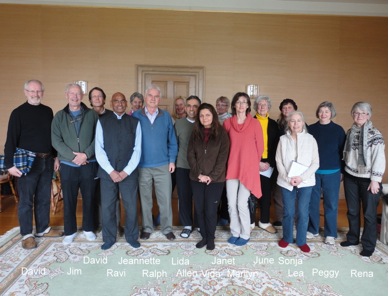Swanwick Star Issue No. 6 (2013)
Effortless Living: the Yoga of Krishnamurti, March 15-17, 2013
Dr. Ravi Ravindra, invited to facilitate a retreat at the Krishnamurti Educational Centre of Canada, had personal contact with Krishnamurti on numerous occasions. He also had a long and varied academic career with degrees in Physics, Philosophy, and Religious Studies and taught many years at Dalhousie University in Halifax.
On the Friday evening Dr. Ravindra gave a public talk and interactive dialogue in Victoria which was very well attended by 67 persons! The weekend retreat, attended by altogether 16 participants (including 6 overnighters and 7 commuters), was an exploration in greater depth of many of the ideas presented at the public talk. Each day there was a guided meditation, a talk by Dr. Ravindra, and time for group discussions of different kinds (exploring quotations of Krishnamurti, participants’ questions and observations, and so on). Also included were some exercises on looking and listening and a Krishnamurti DVD (Ojai 1982, 3rd public talk) was shown.
Dr. Ravindra had a number of stories to relate about his experiences with Krishnamurti and those around him, many of which showed aspects of K’s character and his ways of relating with others. He also presented certain ideas and viewpoints regarding K’s teachings and questions for the group to consider. Topics touched on included the importance of being aware of our deeper motives and what is driving our lives and spiritual search. Our motives are purified as we deepen in our understanding and self knowledge. Right action was discussed as freedom from the “me”: if understanding of the “actor” is right then every action is right. It was suggested that it is important to be aware also of our deep need for approval and fear of disapproval.
One of the points Dr. Ravindra shared was that in studying K we should not take his words too literally but must question and explore what they mean for us. If we take any one statement to be the absolute truth we will become confused when we later hear or read something which seems opposed or different. Dr. Ravindra suggested that such apparent contradictions can be helpful in requiring us to look for ourselves.
It seemed that everyone felt very fortunate to have been visited by Dr. Ravindra and to have shared this opportunity to meet together.
Ralph/David



